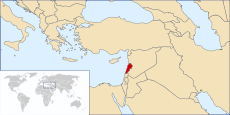
United Nations Security Council Resolution 425, adopted on 19 March 1978, five days after the Israeli invasion of Lebanon in the context of Palestinian insurgency in South Lebanon and the Lebanese Civil War, called on Israel to withdraw immediately its forces from Lebanon and established the United Nations Interim Force In Lebanon (UNIFIL). It was adopted by 12 votes to none; Czechoslovakia and the Soviet Union abstained, and China did not participate.

United Nations Security Council resolution 1559, adopted on 2 September 2004, after recalling resolutions 425 (1978), 426 (1978), 520 (1982) and 1553 (2004) on the situation in Lebanon, the Council supported free and fair presidential elections in Lebanon, urging the Lebanese government to establish control over its territory, disarm militias like Hezbollah, and facilitate the withdrawal of any remaining foreign forces from the country.

United Nations Security Council resolution 520, adopted unanimously on 17 September 1982, after the assassination of Lebanese President Bashir Gemayel and reaffirming resolutions 508 (1982), 509 (1982) and 516 (1982), the Council demanded that Israel withdraw immediately from Lebanon, and that Lebanese sovereignty be respected in order to restore a stable government in Lebanon.

United Nations Security Council Resolution 426, adopted on 19 March 1978 at the 2075th meeting of the Security Council, is concerned with both the creation of the United Nations Interim Force in Lebanon (UNIFIL) and the duration of its mandate. It comes immediately after and complements Resolution 425, adopted during an earlier meeting on the same day.

United Nations Security Council Resolution 436, adopted unanimously on October 6, 1978, after noting the deteriorating situation in Lebanon and being deeply grieved at the loss of life in the country, the Council called upon all parties involved in the hostilities to end acts of violence and observe a ceasefire.

United Nations Security Council Resolution 474, adopted on June 17, 1980, after recalling resolutions 425 (1978), 426 (1978), 427 (1978), 434 (1978), 444 (1979), 450 (1979), 459 (1979) and 467 (1980), and considering the report from the Secretary-General on the United Nations Interim Force in Lebanon (UNIFIL), the Council noted the continuing need for the Force given the situation between Israel and Lebanon.

United Nations Security Council resolution 511, adopted on 18 June 1982, after recalling previous resolutions on the topic, particularly resolutions 508 (1982) and 509 (1982), and considering a report from the Secretary-General on the United Nations Interim Force in Lebanon (UNIFIL), the Council decided to extend the mandate of UNIFIL for another two months, ending on 19 August 1982.

United Nations Security Council resolution 512, adopted unanimously on 19 June 1982, after recalling resolutions 508 (1982), 509 (1982) and reaffirming the Geneva Conventions, the Council reminded all parties involved in the conflict in Lebanon to respect the rights of the civilian population by allowing the free distribution of aid from United Nations agencies and the International Committee of the Red Cross.

United Nations Security Council resolution 513, adopted unanimously on 4 July 1982, after recalling resolutions 508 (1982), 509 (1982), 512 (1982) and the Geneva Conventions, the council expressed its alarm at the deteriorating humanitarian situation in west Beirut and southern Lebanon.

United Nations Security Council resolution 1071, adopted unanimously on 30 August 1996, after recalling all resolutions on the situation in Liberia, particularly Resolution 1059 (1996), the Council extended the mandate of the United Nations Observer Mission in Liberia (UNOMIL) until 30 November 1996 and discussed matters relating to UNOMIL.

United Nations Security Council resolution 1171, adopted unanimously on 5 June 1998, after recalling resolutions 1132 (1997), 1156 (1998) and 1162 (1998) on the situation in Sierra Leone, the council, acting under Chapter VII of the United Nations Charter, terminated the arms embargo against the Government of Sierra Leone.

United Nations Security Council resolution 1188, adopted unanimously on 30 July 1998, after recalling previous resolutions on Israel and Lebanon including 501 (1982), 508 (1982), 509 (1982) and 520 (1982) as well as studying the report by the Secretary-General on the United Nations Interim Force in Lebanon (UNIFIL) approved in 426 (1978), the Council decided to extend the mandate of UNIFIL for a further six months until 31 January 1999.

United Nations Security Council resolution 1386, adopted unanimously on 20 December 2001, after reaffirming all resolutions on the situation in Afghanistan, particularly resolutions 1378 (2001) and 1383 (2001), the Council authorised the establishment of the International Security Assistance Force (ISAF) to assist the Afghan Interim Authority in the maintenance of security in Kabul and surrounding areas. It was the final Security Council resolution adopted in 2001.

United Nations Security Council resolution 1515, adopted unanimously on 19 November 2003, after recalling all previous resolutions on the situation in the Middle East, particularly resolutions 242 (1967), 338 (1973), 1397 (2002) and the Madrid Principles, the Council endorsed the Road map for peace proposed by the Middle East Quartet in an attempt to resolve the Israeli–Palestinian conflict. The resolution, proposed by Russia, envisaged a Palestinian state by 2005 in return for security guarantees for Israel.
United Nations Security Council resolution 1614, adopted unanimously on July 29, 2005 after recalling previous resolutions on Israel and Lebanon, including resolutions 425 (1978), 426 (1978) and 1583 (2005), the Council extended the mandate of the United Nations Interim Force in Lebanon (UNIFIL) for a further six months until 31 January 2006.

Resolution 1973 was adopted by the United Nations Security Council on 17 March 2011 in response to the First Libyan Civil War. The resolution formed the legal basis for military intervention in the Libyan Civil War, demanding "an immediate ceasefire" and authorizing the international community to establish a no-fly zone and to use all means necessary short of foreign occupation to protect civilians.

United Nations Security Council Resolution 1773 was unanimously adopted on 24 August 2007.

United Nations Security Council Resolution 1832 was unanimously adopted on 27 August 2008.

United Nations Security Council Resolution 1884 was unanimously adopted on 27 August 2009.

















